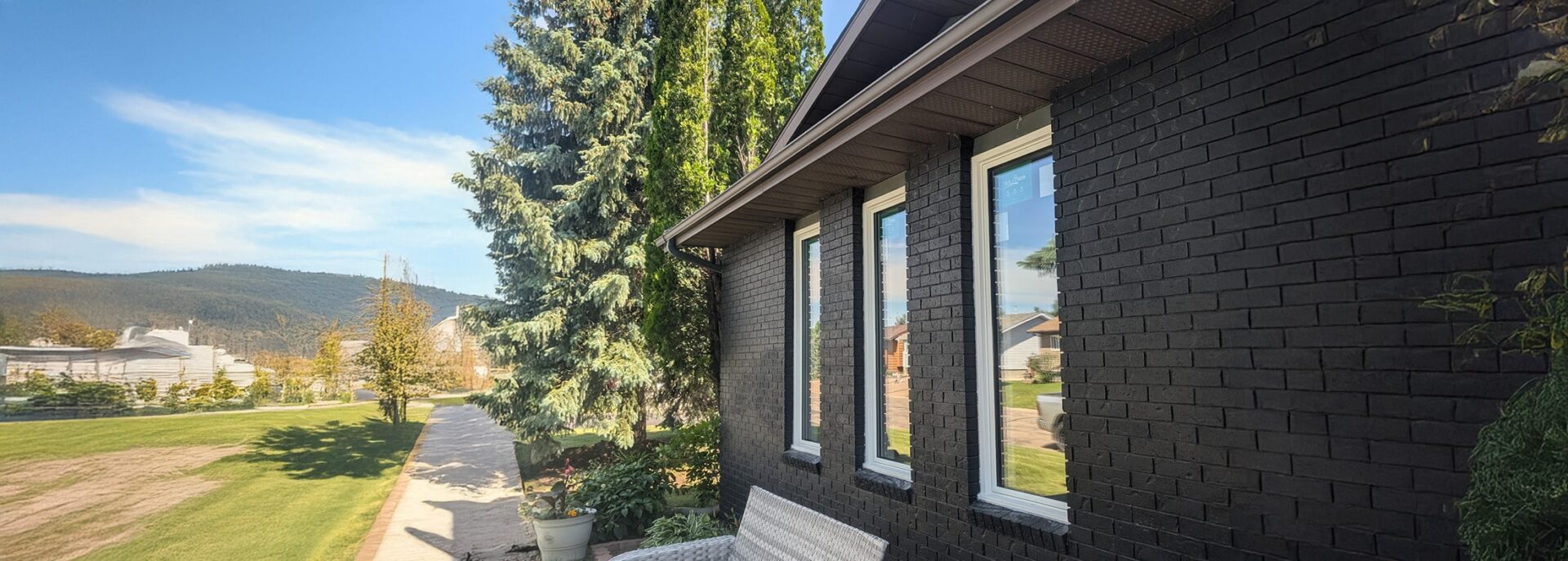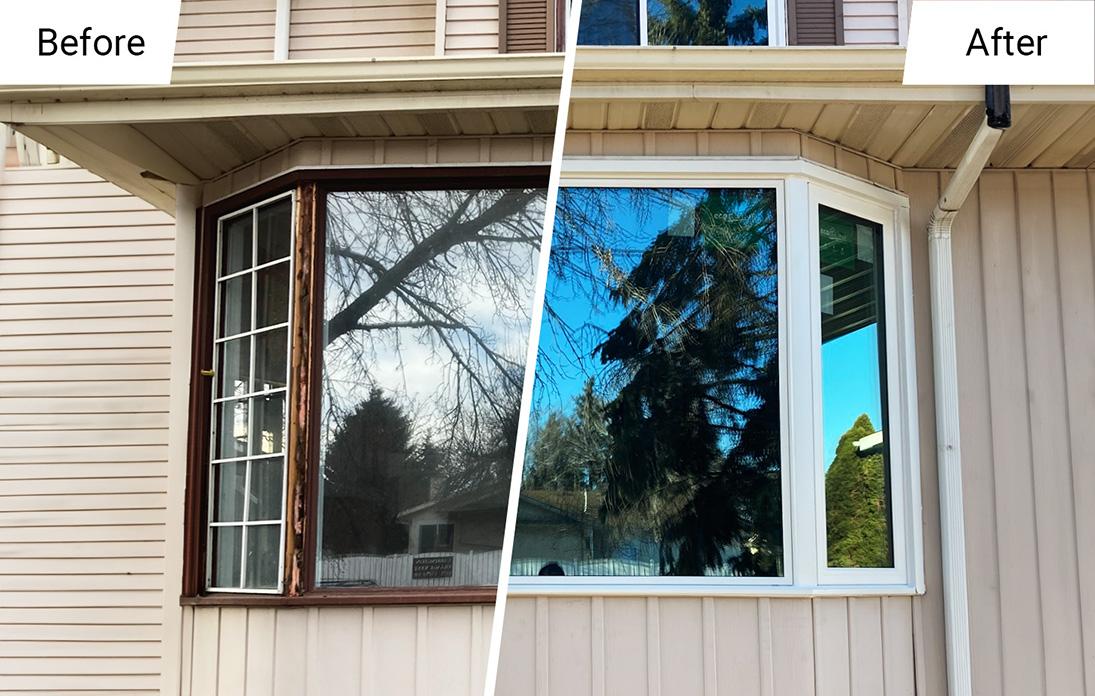

How Often Should You Replace Windows In Your House?
Jun 11, 2025
7 min read
2440
Whether you are buying, selling, or simply looking to renovate your house, window replacement is one upgrade that always comes up in conversations about older homes.
A lot of times sellers will replace windows to upgrade the look of the house and get a better price. Similarly, new homeowners consider replacing their windows for potential energy savings.
Statistics show that a window replacement is one of the top-rated home renovation projects that comes with a whopping ~70% ROI. Coupled with the fact that average Canadian household spends roughly $2,200 annually on energy annually, with higher costs for those living in older homes with poor insulation, new windows usually top the list of the most demanded home renovations.
But when to replace windows? Let’s find out!
How Often Do Windows Need To Be Replaced?
Part of answering that question properly is figuring out the current conditions of your home windows and what are the main issues with them. Believe it or not, most companies don’t say this too often, but most window problems can be remedied before a replacement is necessary.
Of course, there are exceptions. Leaks or streaks on your walls or rotten wood usually mean that the seal around the window is broken and one of the most alarming signs it’s time to replace windows. Even if the window itself can be salvaged, it probably still needs to be re-installed and sealed properly, often involving replacement of the frame. In this case, you are obviously better off getting a replacement.
But if the majority of components in your window are still in working order, and in good condition, the fix may very well be something you can do yourself. Drafts or leaks can often be a result of misaligned sashes, worn-out weatherstripping, or cracked caulking. In all of these cases, the fix is something a homeowner can DIY, applying cheap fixes.
In short, there is no specific answer to how often you should replace your windows. This will depend on the age of your house, the material your windows are manufactured from, and the actual condition of the units and walls around them.
A lot of window companies will throw the number 25 years out, but in reality, there are quality wood windows that still work and look great today that have been installed well over fifty years ago. There are also retrofit installations that have to be redone within five years because the wood around the insert windows has completely rotted in that time.

How Long Do Vinyl Windows Last?
One of the reasons why most window manufacturers in Canada now work primarily with vinyl windows is because this material is extremely durable and time-resistant. Most companies today offer 20-25 year warranties on vinyl windows, calling it a lifetime warranty.
What’s important not to confuse here, is that “lifetime” in this case doesn’t refer to your lifetime, but rather the expected average lifespan of windows. The Canadian Standards Association also abides that windows built to CSA standards have an expected window lifespan of 25 years.
So are replacement windows a worthy investment?
If you consider that a quality product that was installed correctly should last you, at least, a quarter century, then the answer is yes. What happens in practice, is that people often go bargain hunting and look for the cheapest and quickest solutions. But cutting corners may only shorten the time between window replacements, and negate any value in your investment.
Vinyl vs. Aluminum vs. Wood Windows – What’s Better?
Wood windows were the standard for Canadian homes built in the 1970s and ’80s, valued for their natural aesthetics and insulation. However, they’re now considered outdated technology due to high maintenance needs and susceptibility to weather damage.
Today, most window companies have transitioned to more durable, energy-efficient vinyl (uPVC) options, now the most popular choice for modern residential houses.
Aluminum windows, while strong and low-maintenance, are less common in residential homes because they lack the energy efficiency of vinyl and can make interiors colder during Canadian winters.
However, aluminum remains popular in commercial buildings due to its sleek appearance and strength, especially for large window designs.
Vinyl Windows
- Lifespan: Around 25-30 years with minimal maintenance.
- Pros: Highly energy-efficient, cost-effective, and resistant to moisture and warping.
- Cons: Worse noise-insulation
Aluminum Windows
- Lifespan: Typically lasts 20-25 years but may require maintenance to prevent corrosion, especially in humid areas.
- Pros: Strong, lightweight, and offers a sleek, modern appearance. Aluminum frames are excellent for larger windows.
- Cons: Less energy-efficient due to high thermal conductivity, which can make homes colder in winter without thermal breaks.
Wood Windows
- Lifespan: With proper maintenance, can last over 30 years.
- Pros: Provides a natural, classic look and decent insulation. Wood can be painted or stained, offering aesthetic flexibility.
- Cons: Requires regular maintenance to prevent warping, rotting, and insect damage, especially in humid climates. Generally more expensive than vinyl and aluminum options.
F.A.Q
What is the lifespan of modern windows?
Modern house windows in Canada are designed with advanced materials, offering excellent window durability and longevity. Typically, high-quality windows last between 20-30 years, depending on maintenance and exposure. Choosing energy-efficient models and proper installation can further extend the lifespan of your windows, keeping your home well-insulated and comfortable.
How to replace windows?
Replacing windows involves removing the old units, preparing the opening, and installing new energy-efficient models. Most homeowners opt for professional installation to ensure a proper fit, maximum insulation, and tight sealing. If you’re wondering how to replace window units safely and efficiently, start with a free from certified installers.
How to install replacement windows?
To install replacement windows, first remove the existing sashes and inspect the frame. Then, insert the new window, secure it with fasteners, and apply insulation and caulking. Professional house windows replacement ensures better energy performance, proper sealing, and compliance with local building codes.
What window material is best?
Vinyl windows are considered best for residential properties. They are cost-effective, durable and highly energy-efficient, making them a much better choice when compared with overpriced wood or less energy-efficient aluminum windows.
How to replace a window pane?
Replacing a window pane involves removing the broken glass, measuring the opening, and securing a new pane using glazing putty or clips. However, if the window is old or poorly insulated, replacing the entire unit is recommended for improved energy efficiency and long-term performance
How to replace a window from the inside?
Window replacement from the inside is recommended when the exterior access is limited. The process includes removing interior trim, detaching the old window, inserting the new unit, and resealing it. This method is common in winter or for upper floors but may limit proper insulation.
1750 Coast Meridian Rd #102,
Port Coquitlam, BC V3C 6R8
100, 17866 106A Avenue,
Edmonton, AB, Canada,
T5S 1V3
3307 Dunmore Rd SE #12,
Medicine Hat, AB,
Canada, T1B 3R2
2081 Merivale Rd #201, Ottawa, ON, Canada, K2G 1G9
by appointment only
109 Ilsley Ave Unit #3, Dartmouth,
NS, Canada, B3B 1S8











